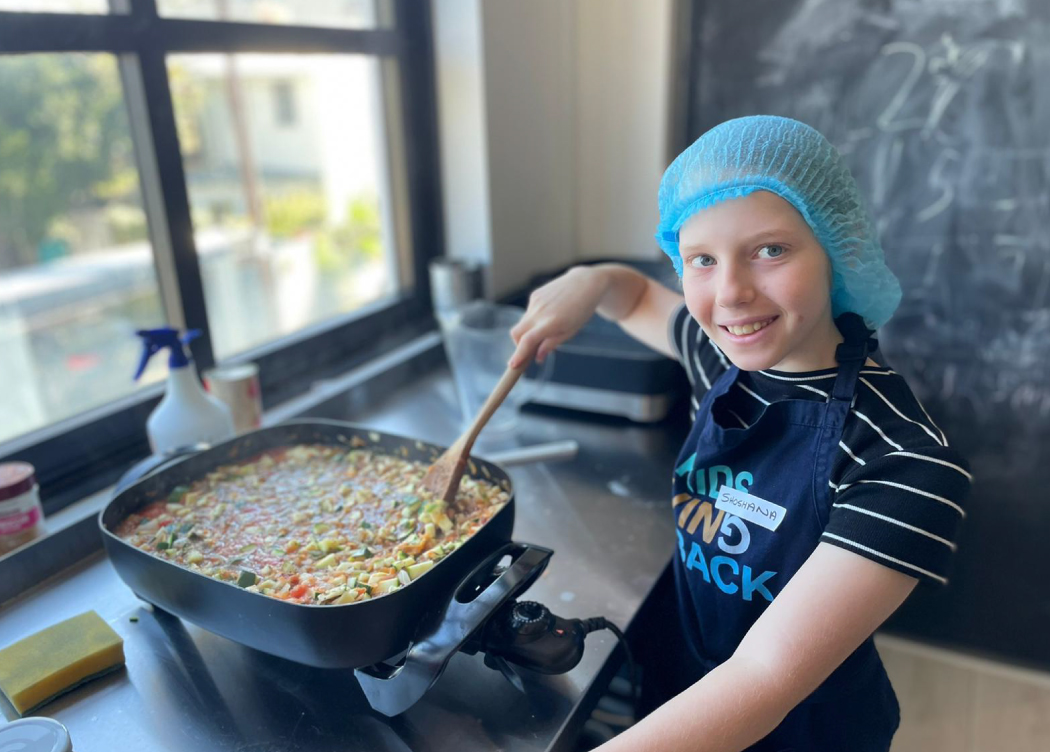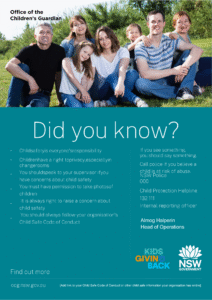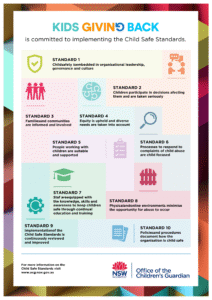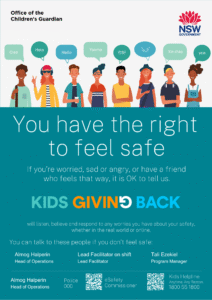Your child’s safety is our number 1 priority. Please find our policies below.
Child Safe Policy
Policy Statement
Kids Giving Back is a child safe organisation. We want children to be safe, happy and empowered and have a zero-tolerance approach to behaviour compromises that. Our organisation supports and upholds the 10 national principles for Child Safe organisations. We support and respect all children, as well as our staff and volunteers and we are committed to the safety, participation and empowerment of all children.
This policy applies to all adults involved as part of Kids Giving Back activities, including Board, staff, volunteers, Youth Ambassadors, contractors and parents.
Principles
National Principles for Child Safe Organisations
- Child safety and wellbeing is embedded in organisational leadership, governance and culture.
- Children and young people are informed about their rights, participate in decisions affecting them and are taken seriously.
- Families and communities are informed and involved in promoting child safety and wellbeing.
- Equity is upheld and diverse needs respected in policy and practice.
- People working with children and young people are suitable and supported to reflect child safety and wellbeing values in practice.
- Processes for complaints and concerns are child focused.
- Staff and volunteers are equipped with the knowledge, skills and awareness to keep children and young people safe through ongoing education and training.
- Physical and online environments promote safety and wellbeing while minimising the opportunity for children and young people to be harmed.
- Implementation of the national child safe principles is regularly reviewed and improved.
- Policies and procedures document how the organisation is safe for children and young people.
Procedures
Kids Giving Back is committed to preventing child abuse and identifying risks early and removing and reducing these risks. All Board, employees and volunteers will receive training and support on child safe practices. Child protection will be a standing agenda item on all Board and team meetings.
We have robust human resources and recruitment practices to reduce the risk of child abuse by new and existing board members, staff and volunteers. These practices include reference checks, supervision and working with children checks.
We are committed to the cultural safety of Aboriginal children, the cultural safety of children from culturally and/or linguistically diverse backgrounds, and to providing a safe environment for children with a disability.
All Board, staff and volunteers are expected to adhere to our Child Safe Code of Conduct below. Failure to do so will result in termination of employments/ engagement with Kids Giving Back.
Child Safe Code of Conduct
This Child Safe Code of Conduct outlines appropriate standards of behaviour by adults towards children. Kids Giving Back aims to provide a child safe environment and uphold the Australian Child Safe Principles for organisations. The code aims to protect children and reduce any opportunities for abuse or harm to occur. It also helps staff and volunteers by providing them with guidance on how to best support children and how to avoid or better manage difficult situations.
All Kids Giving Back personnel are responsible for promoting the safety and wellbeing of children and young people by:
- Adhering to this code and other organisation policies
- Taking all reasonable steps to protect children from abuse
- Treating everyone with respect, including listening to and valuing their ideas and opinions
- Welcoming all children and their families and carers and being inclusive
- Respecting cultural, religious and political differences and acting in a culturally sensitive way, particularly when interacting with children who are Aboriginal or otherwise culturally or linguistically diverse and those with a disability
- Modelling appropriate adult behaviour
- Listening to children and responding to them appropriately
- Reporting and acting on any breaches of this code, complaints or concerns appropriately and treat them seriously and with respect.
- Complying with our guidelines on physical contact with children
- Working with children in an open and transparent way – other adults should always know about the work you are doing with children
- Respecting the privacy of children and their families and only disclosing information to people who have a need to know.
Kids Giving Back employees, contractors or volunteers MUST NOT:
- Shame, humiliate, oppress, belittle or degrade children or young people;
- Ignore or disregard any concerns, suspicions or disclosures of child abuse
- Use prejudice, oppressive behaviour or language with children
- Engage in rough physical games
- Discriminate on the basis of age, gender, race, culture, vulnerability or sexuality
- Engage in any activity with a child or young person that is likely to harm them physically or emotionally;
- Initiate unnecessary physical contact with a child or young person, or do things of a personal nature for them that they can do for themselves;
- Be alone with a child or young person unnecessarily and for more than a very short time;
- Develop a ‘special’ relationship with a specific child or young person for their own needs;
- Expose children to inappropriate imagery, including on age-inappropriate websites, for any reason.
- Use social media inappropriately and not engage in social networking with any children who have attended a program under the age of 16 or their siblings.
- Arrange contact, including online contact, with children or young people outside
of the organisation’s programs and activities; - Photograph or video a child or young person without the consent of the child and his/her parents or guardians;
- Work with children or young people while under the influence of alcohol or illegal drugs;
- Engage in open discussions of a mature or adult nature in the presence of children;
- Use inappropriate language in the presence of children; or
- Do anything in contravention of the organisation’s policies, procedures or this Code of Conduct.
Child Safe Code of Conduct
Purpose
This Code of Conduct sets clear expectations for behaviour towards children and young people, ensuring a safe, inclusive, and empowering environment for all. It aligns with NSW legislation, the Child Safe Standards from the Office of the Children’s Guardian, and the National Principles for Child Safe Organisations.
Scope
This Code applies to all personnel engaged with Kids Giving Back, including:
- Board members
- Employees
- Volunteers
- Youth Changemakers
- Contractors
- Parents and carers involved in activities
Our Commitment
Kids Giving Back is committed to:
- Upholding the 10 Child Safe Standards and National Principles for Child Safe Organisations.
- Maintaining a zero-tolerance approach to child abuse and neglect.
- Promoting cultural safety for Aboriginal children, children from culturally and/or linguistically diverse backgrounds, and children with disability.
- Ensuring all children and young people are safe, respected, and empowered.
Expected Standards of Behaviour
All personnel must:
- Act in the best interests of children and young people at all times.
- Adhere to this Code and all organisational policies and procedures.
- Take all reasonable steps to protect children from harm, abuse, or neglect.
- Treat all children, young people, and families with respect, equity, and inclusion, regardless of age, gender, ability, race, culture, religion, sexuality, or background.
- Model positive and appropriate adult behaviour.
- Listen to children and young people, value their opinions, and empower them to participate in decisions affecting them.
- Respond to and report any concerns, disclosures, or breaches of this Code promptly and appropriately.
- Maintain appropriate physical and emotional boundaries; only engage in physical contact that is necessary, appropriate, and consented to.
- Work with children in open and transparent ways; avoid situations where you are alone with a child or young person unless absolutely necessary and for the shortest time possible.
- Respect the privacy and confidentiality of children, young people, and their families, sharing information only with those who need to know for the safety and wellbeing of the child.
- Comply with all legal obligations, including mandatory reporting requirements under NSW law.
Unacceptable Behaviour
Personnel must NOT:
- Shame, humiliate, oppress, belittle, or degrade a child or young person.
- Ignore or fail to act on any concerns, suspicions, or disclosures of child abuse, neglect, or inappropriate conduct.
- Use discriminatory, prejudiced, or oppressive language or behaviour.
- Engage in rough, inappropriate, or physical games.
- Initiate or engage in unnecessary physical contact, or do things of a personal nature that a child can do for themselves.
- Be alone with a child or young person unnecessarily or for more than a brief period.
- Develop or encourage ‘special’ relationships with a child or young person for personal needs or advantage.
- Expose children to inappropriate material, including age-inappropriate websites, images, or conversations.
- Engage in open discussions of mature or adult topics in the presence of children.
- Use inappropriate, offensive, or sexual language in the presence of children.
- Arrange contact, including online, with children outside of official organisational activities.
- Take photographs or videos of children without the informed consent of both the child and their parent/guardian.
- Work with children or young people while under the influence of alcohol or illegal drugs.
- Engage in social networking or online communication with children under 18 (or under 16, depending on organisation policy) or their siblings outside organisational activities.
- Contravene any organisational policy, procedure, or this Code of Conduct.
Reporting Obligations
- All personnel are required to report any breach of this Code, or any concerns about child safety, to the appropriate person within Kids Giving Back as soon as possible.
- Reports will be treated seriously, confidentially, and in accordance with organisational procedures and legal obligations.
- Failure to comply with this Code may result in disciplinary action, including termination of employment or engagement, and may be reported to external authorities as required by law.







